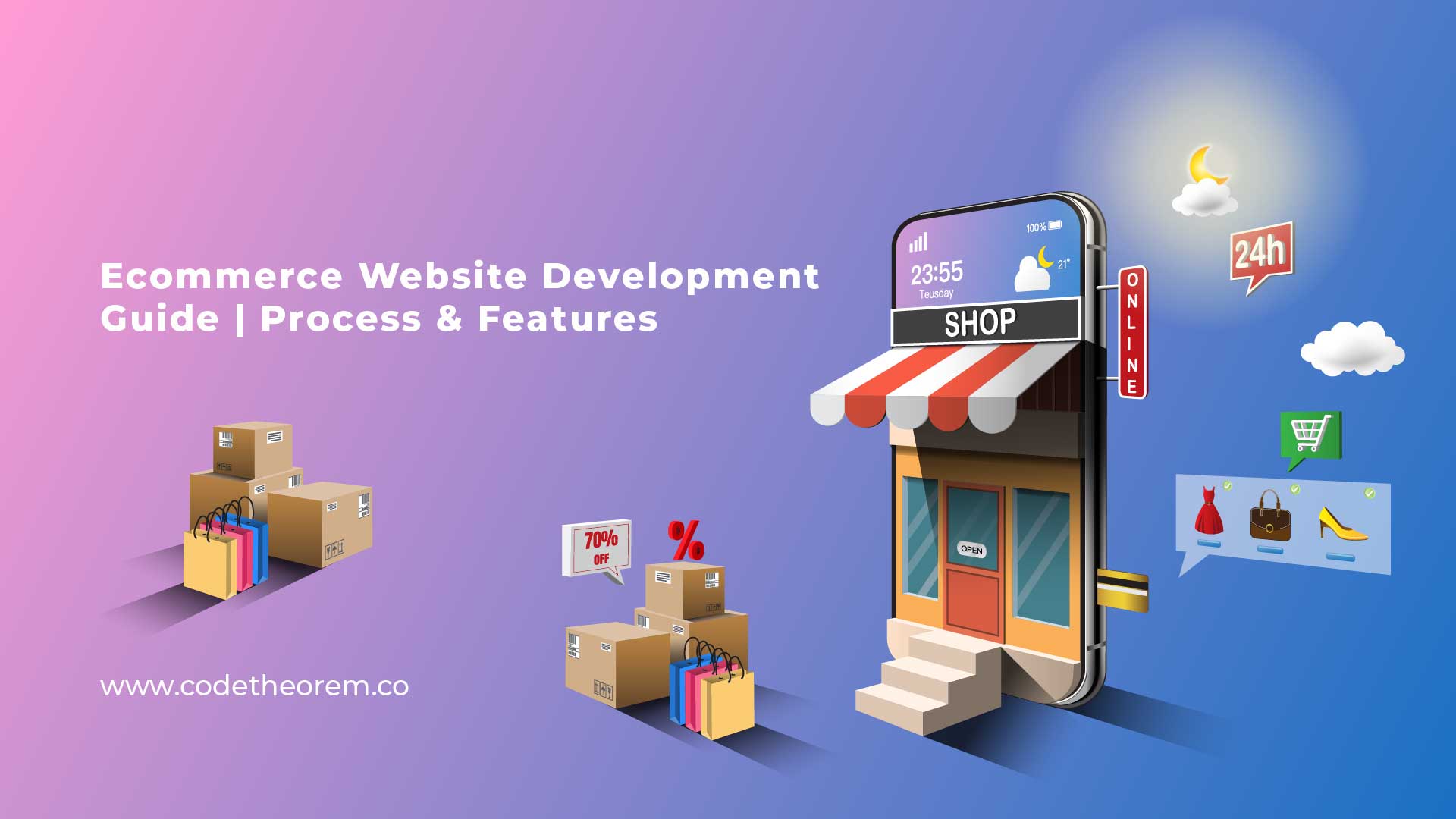Article content
Introduction
Competing in eCommerce is as important as competing with brick & mortar businesses. It is no more a luxury. eCommerce has become a need. Especially if you want to scale and reach new heights. And for this, you must invest in eCommerce website development. Or should we say custom eCommerce website development? eCommerce websites and online stores help you make money 24/7. They play an essential role in:
- Retaining customers
- Increasing sales
- Establishing a presence, and more.
And thus, eCommerce website development is a one-time investment with long-term results. So if you are a startup or a small business owner wanting to start eCommerce, keep reading.
This blog will contain the following:
- Rise of eCommerce Business
- eCommerce development process
- Must-have features
Rise of eCommerce Business
eCommerce business is not a fleeting trend. It is here to stay. The following are some statistics that highlight the rise of eCommerce businesses:
- Global eCommerce sales may exceed $6 billion by 2024.
- Shopify nearly has a 26% market share, making it the most popular eCommerce platform.
- Shopify powers about 1.7 million ecommerce sites.
- The average conversion rate for B2B eCommerce sites for Organic search is 3.3%.
- The number of digital buyers worldwide is over 2.14 billion.
The above mentioned statistics reflect the trends in the eCommerce business sector. Given its growing popularity, starting an eCommerce store becomes critical. And to do so, you must have enough knowledge about the eCommerce web development process.
Let’s see how you can complete a custom eCommerce website development process.
Ecommerce Development Process
Custom eCommerce development can be a tricky process. You may know how you want your online store to look but have no idea how to go about it.
A proper eCommerce web development process will ensure that your website turns out how you want it to be. Furthermore, it will ensure that your eCommerce website has essential functionalities and features.
Follow the eCommerce website development process given below for building an eCommerce website.
1. Determine Your Business Goals
Your offerings play a crucial role in determining the success of your eCommerce website. There are hundreds and thousands of products in the world.
Some of these are everyday essentials, while others are seasonal. Also, some products are only used by specific individuals, while others are for everyone. As a result, what you decide to sell can make or break your eCommerce business.
Research the needs of the market and the availability of the goods to choose a product. Also, research your competitors to see what they’re selling. See how they are selling. Analyze what’s attractive about their website. Is it the design, the offers, or how they display the products?
Chart out the comparison and see what you can adopt.
2. Sketch Your Customers
Ask yourself the following questions:
- What do your customers look like?
- What are their preferences?
- How much can they spend?
The answers will help you sketch how your customers look. Understanding how your customers think and behave helps to connect with them better. Moreover, it helps to personalize your product, i.e., your website.
Define the following aspects:
- Demographics – age, gender, background
- Finance – Salary, spending potential
- Areas of focus – existing problems, unsatisfied needs, etc.
3. Determine Your eCommerce Business Model
After sketching your customers, choose how to do you want to reach out to them. Do you want to be a retailer or a wholesaler? Furthermore, go back to your goal. It will help you decide what kind of model you want to adopt. Among the many models, B2B and B2C are the common ones.
B2B Model
Are you considering marketing? Or reselling your company’s goods and services to other companies? If yes, you should have a B2B eCommerce platform. This is to use other well-known businesses to broaden your reach in a demographic. For instance, IndiaMart, Amazon Business, and Alibaba Wholesale.
B2C Model
If your product is tailored to each user’s end requirements, then you must use the B2B model. This eCommerce website is only to showcase, advertise, and sell your items. For instance, Amazon and Flipkart.
4. Specify Branding Factors
Your eCommerce website is not only a means to sell your product. It is also a means to increase your visibility and create brand awareness. Lock down the branding factors that will help you distinguish yourself. These include the following:
- Brand name
- Logo
- Color palette
Choosing a different name will ensure that individuals remember it. Pick a name that sets your brand apart from other companies. It should be creative, brief, and distinctive. Also, you’ll have a higher chance of obtaining your perfect domain name if you have a unique brand name.
A logo and color scheme have greater power to stick in people’s thoughts when they think of a company. A memorable logo may help your company stick in clients’ thoughts even without the brand name.
5. Determine the Shopping Experience
A memorable shopping experience will keep your customers engaged. But how do you create an eCommerce website with a seamless shopping experience? By doing the following:
- Map out the journey from when your customer lands on your page to the checkout.
- Identify the major checkpoints.
- Once you identify the checkpoints, see what you can do differently. Maybe you can add a quirky message or play with the design when they check out. You can add a catchy CTA or use social proof to add credibility.
Ensure the customer can go from point A to point B without hassle. This will ensure that their experience is memorable.
6. Choose the Right eCommerce Platform
This is another crucial step in your eCommerce website development process. Choosing the right eCommerce development services will help you create an unforgettable experience. It will help your website become functional and responsive.
The following are some of the leading solutions that you must have:
- Easy to use content management system
- Attractive themes
- Suitable hosting plans
- Convenient payment gateways
- Custom features and extra plugins
Different eCommerce platforms offer different features at varied prices. You must choose the one that:
- Fulfils your needs
- Provides all the necessary features at minimal cost
Some eCommerce platforms are easy to use. But it’s best to hire an eCommerce website development company. An eCommerce website development company is well-versed with all eCommerce development services. As a result, the time needed for eCommerce website development is short. Furthermore, adding extra functions and integrating them with other platforms becomes easier.
7. Payment Gateway & Shipping Setting
As an eCommerce website, integrating a payment gateway is necessary. A payment gateway encrypts the customer’s card information. As a result, it enhances security. Furthermore, some of them allow for monthly and annual subscriptions. Additionally, they help save money on transaction fees.
Not all eCommerce platforms allow you to add more than one payment gateway. More than one payment gateway allows your customers to pay at their convenience. Thus, choose a platform that gives you options.
Also, focus on the shipping settings. There are several add-ons and extensions available. Also, there are different models. The following are some of them:
- Table rate shipping
- Flat rate shipping
- Per product shipping
- Conditional shipping
Decide what you want to offer. The shipping settings will also depend on the geographical area you are targeting. See what suits you the best, and integrate it into your eCommerce website.
8. Testing and Launching the Website
Once your website is ready, it’s time to test it. Test its compatibility with different screen sizes. Also, see if the eCommerce website design suits all screens equally. Furthermore, ensure the payment gateway is easy to use. The security standards for payment and database meet the highest levels.
Also, see if the add-ons are functioning well. Once you are satisfied, you can move on to launch your website and make it accessible to everyone.
9. Hire an eCommerce Website Development Agency
Most eCommerce web development platforms are easy to use. You can build an essential website yourself. But, to stand out and create a fully functional website, hiring an eCommerce web developer is best.
A good eCommerce developer will:
- Develop your website from scratch
- Ensure it is mobile-responsive
- Maintain consistency across the website
- Build your website in a shorter time-frame
- Fix the bugs and more.
You will not have to worry about your website’s functionality. An eCommerce web developer will also help you add more products. Furthermore, they will make the necessary changes in the design or content if needed. They are excellent at custom eCommerce website development. So why not take their help to create an attractive eCommerce website?
Must-Have Features
Having too many or too few features impacts your eCommerce website development process. Too many features can make the website very tricky. Similarly, too few can make it very simple. The key is to strike a balance between must-have features and advanced features.
Following are some features your eCommerce web developer must add to the website:
Responsive Design
One cannot stress enough the importance of responsive design, especially as customers choose to shop online using their mobile phones. The aim is to maintain consistency across mediums when customers access your website. Be it on a mobile screen or desktop. It’s about making your website look good on all screens.
SEO Capabilities
Want to rank at the top? SEO is the way to do it. Ranking high for relevant keywords can increase your traffic. This, in turn, will increase your sales. SEO is an essential aspect of your content strategy which you cannot neglect.
Site Speed
Do you know the average bounce rate for eCommerce sites? It’s a whopping 47%. Furthermore, the bounce rate on mobile is higher than the bounce rate on desktop.
What does this suggest? Website loading speed has a direct impact on your bounce rate. The slower the website higher the bounce rate. Also, bounce rate plays a vital role in Google ranking. Why? Because site speed is one of the deciding factors.
eCommerce developers can help you optimize your website by increasing the loading speed.
CMS
CMS is your one place for everything – blogs, visuals, and more. It helps you add new content and make changes to the existing one. These changes or additions will reflect on your website. Thus a robust CMS with an easy-to-use editor is essential for keeping your site updated.
Product Management
Tracking your inventory is important. What if the product is showing on the site, but you don’t have it in stock? Furthermore, what if you are not aware of it? This way, you can quickly lose your customers to your competitors. Thus, ensure to have features to manage products during custom eCommerce website development.
Payments and Checkout
With so many payment options today, proving just one on your eCommerce store can be a drawback. Flexibility in payment can speed up the decision-making process of your customers. Also, it allows them to pay at their convenience. Thus integrate as many payment options as possible during custom eCommerce website development.
Security
Security is vital in the eCommerce marketplace for maintaining a safe, bug-free website. Several hackers and fraudsters attack the eCommerce marketplace. They do so to get information about consumers, products, prices, and financial details.
Thus, pay close attention to data security. And to do so, the site must use many security measures. For instance, ensure your website meets the SSL and PCI standards.
Conclusion
eCommerce website development is a demanding task. It requires you to think 360 degrees. For instance, what will be your USP, and what features will your users find helpful? But eCommerce development can be easier with the help of an eCommerce web developer.
Remember, your website gives you a chance to present yourself the way you want your audience to see you. Put thought into it. Invest your time and resources.
Study your competitors, see what’s trending, and take help from the experts. They know the eCommerce sector in and out. And thus, they can help you build the website of your dreams!


















